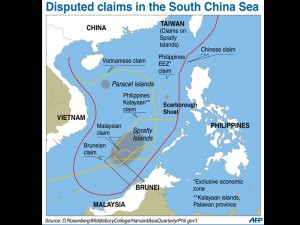
Map showing the disputed areas in the West Philippine Sea (south China Sea), including the Spratlys Islands and Scarborough Shoal. AFP
PHNOM PENH, Cambodia––In spite of rifts within the Association of Southeast Asian Nations (Asean), President Benigno Aquino III said the bloc has taken a significant step forward in the drafting of a code of conduct that would guide talks on the members’ territorial disputes with China.
In a briefing for Philippine journalists covering the Asean summit on Monday night, Aquino said he was happy that there was growing consensus among the claimant countries in the Asean to move toward the formulation of legally binding rules for the discussions.
Aside from the Philippines, Vietnam, another claimant to parts of the South China Sea, and Singapore, a non-claimant, have pushed their neighbors to “formalize the talks that will formulate the COC (code of conduct),” he said.
Aquino said he considered this a major development that contrasted with the slow progress of talks since the signing of the Declaration on the Conduct of Parties in the South China Sea, or the DOC, a non-binding pact entered into by the claimants in 2002.
In the Asean, the rule is not by majority, but by consensus, he said. “If even one objects, there’s no consensus.
“So that position of formulating the COC – whereas before there was no discussion of when to formulate – is I think a very significant step,” Mr. Aquino told Filipino reporters at Sofitel here, where he was billeted.
He pointed out that in July, when the Asean foreign ministers failed to issue a joint communique after host Cambodia blocked any mention of individual disputes with China over the South China Sea there was no statement whatsoever on the COC. Manila has renamed part of the South China Sea the West Philippine Sea.
“But now, publicly, the countries are saying ‘let us formalize…’ There have been informal talks on the drafting or the formulation of the COC. Let us now proceed to formalize the formal dialogues on the formulation of the COC,” he said.
“I think there’s a huge difference between the two meetings (in July and in November). And that’s where I became hopeful that after the 2002 DOC, the COC could soon follow,” Aquino said. “So I think we should be thankful that our positions have [started to coalesce].”
Aquino said it was enough for him to have his voice heard. “It’s as though our job here is to convince our brother countries” to start the drafting of the COC.
He likened the COC to an enabling law. “You know the Constitution is the fundamental law of the land, but it needs an enabling law. In my view, the COC is like that. Say, there’s a philosophy you agree to among each other, but how do you manifest that in reality?” he said.